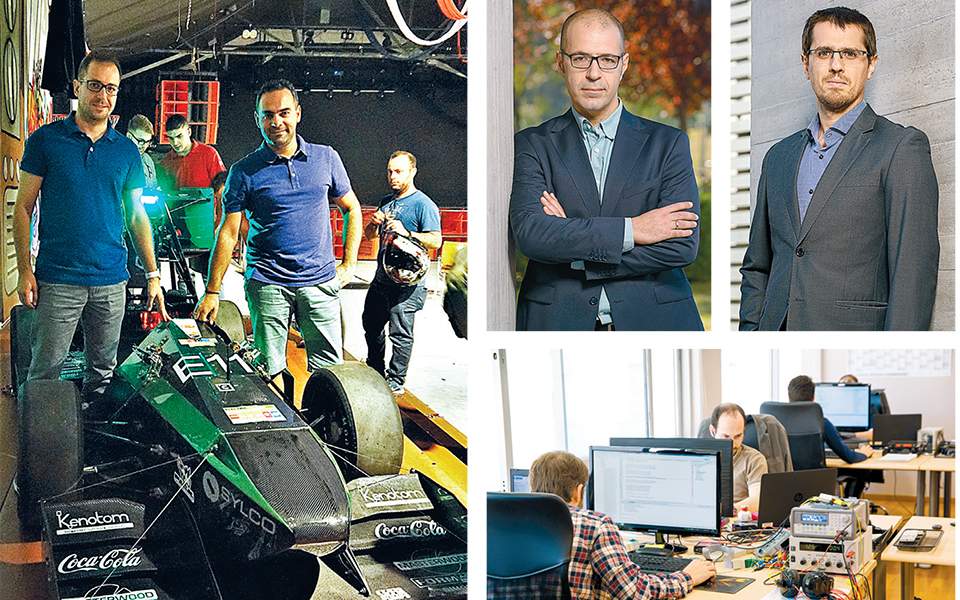Greek startup building brains for international auto industry

Startup company Kenotom is one of the success stories that stood out at the inaugural Greek-German Innovation Forum at the Stavros Niarchos Foundation Cultural Center (SNFCC) in southern Athens a few months ago.
The forum, titled “Innovation as a Growth Lever – a Greek-German Cooperation,” was co-organized by the Hellenic-German Chamber of Commerce together with the German Embassy in Athens. The main topic of conversation at the forum was the production of specialized electronic control units (ECUs), the so-called “brains” of the car.
Kenotom’s co-founders, Fotis Panteliadis and Tilemachos Matiakis, are both electrical engineers who graduated from the Aristotle University of Thessaloniki – Matiakis completed his PhD dissertation at the Technical University of Munich in Germany, a country both men have worked in.
They decided to move back to Greece to start a company together in Thessaloniki in 2014 – for most people, the worst time to open a business in the crisis-hit country.
“In our case it was the ideal time, even though the country’s situation was far from favorable. In any case we expected difficulties as it was our first attempt at starting a business, but the threat was greater due to the circumstances,” Panteliadis, also Kenotom’s general director, told Kathimerini.
“From power door locks or automatic windshield wipers to ESP (electronic stability programs), ABS (anti-lock braking systems) and airbags – such embedded computer systems are everywhere in cars today – they are the ‘brains’ that drive cars from behind the scenes,” Matiakis explains.
Where do the main systems in the global market today come from? According to Panteliadis, “these devices are not developed by carmakers. They have their own supply chain, the automotive electronic suppliers. To cover the production needs of a new car model, big companies often outsource specific jobs.
Right now, there are five main car manufacturers that dominate the industry worldwide: Three are German, one is in the Far East, one is in Canada. We collaborate with some of them, as well as others in the sector.”
How difficult was it to get such behemoths of the automotive industry to place their trust in a company in Thessaloniki with 76 staff? “We were able to build a trusting relationship with car manufacturers in a very short period of time thanks to the quality of work we provide and the highly skilled mechanics that we employ – we hire top graduates from Thessaloniki’s Aristotle University,” Matiakis points out, and Panteliadis adds, “Our work experience in the industry outside of Greece and the network we had already built certainly helped in that direction.”
Regarding the link between universities and the Greek labor market, Kenotom’s co-founders explain: “Especially in the case of Thessaloniki, there is a very small number of companies that have the means to absorb graduates. As a result, those graduates leave either for Athens or, in most cases, abroad. The level of training offered by Greek universities is pretty high, although it’s more theoretical. But if the right theoretical foundations are combined with the proper guidance, they can soon lead young scientists to become truly productive. We often hear about Germany’s ‘incredible engineering’ – that is a myth! They may outweigh their peers regarding facilities or factories, but they do not provide the indispensable deepening of the theory.”
Has there been any government support for the company’s efforts up to now? “The government’s contribution has been neutral,” Panteliadis says. “It bothers me that our country’s visibility exists only through primary production and tourism, whereas, in my opinion, Greece’s future lies in technology. We attend international meetings, we distribute our cards, and nobody understands how the University of Thessaloniki trains worthy scientists capable of assisting in projects that will change the world. On the other hand, we notice that countries like Romania, Serbia, the Czech Republic and Poland have made a name for themselves as ‘technology-friendly countries.’ Why not Greece, too?”
What other obstacles does your sector face? “Compared to other professional associations, our unions are dormant. Additionally, the lack of expert scientists is truly a weakness for Greece. Our company is becoming so dynamic that we need more experienced partners and we are forced to look for them abroad. We want to have a positive impact on society – repatriating Greek experts is of prime importance, although our attempts have not been very successful. Think of someone Greek, who is about 35-40 years old and works at Volvo, for example. He is settled in Sweden with his family, he has privileges. How can we just tell him to come back? The risk is too great.”
Aside from the development of microcomputers for cars, Kenotom also supports student projects. “We are the sponsors of four teams. We are impressed by their performance, and we can see future colleagues among them,” they point out. When asked if there is something they are proud of, they say: “When we notice the cars stopped at a red light and we count those whose comfort, safety and eco-friendliness our company has contributed to, we really feel that our work is worth it.”





